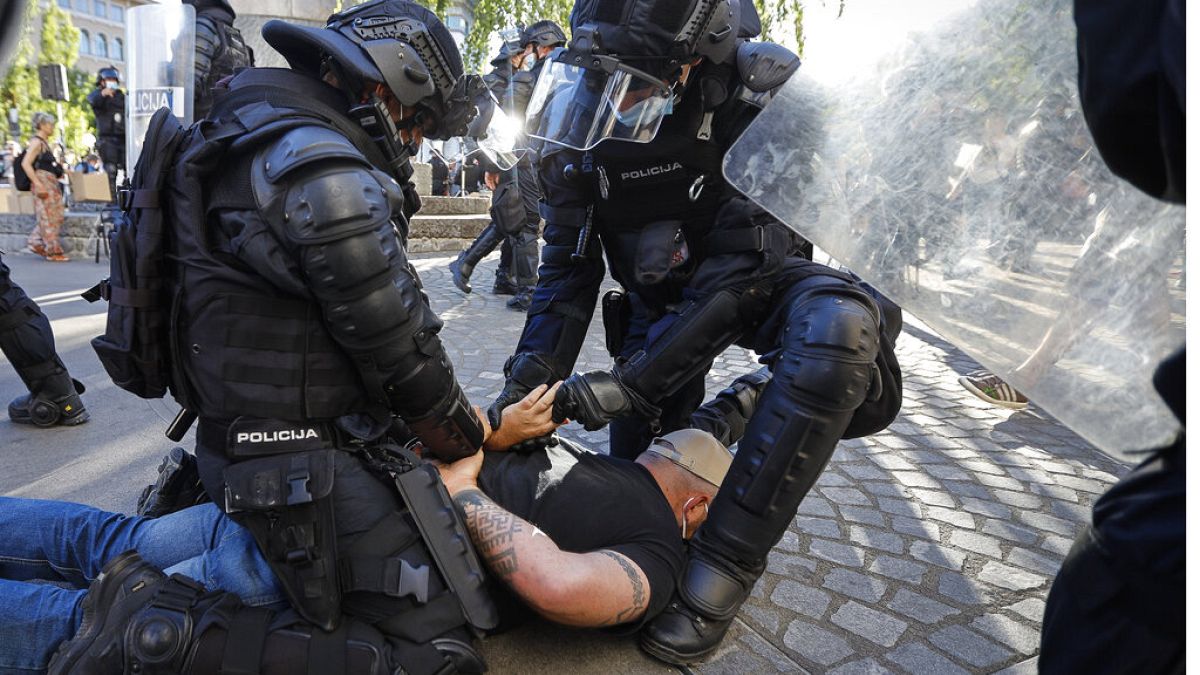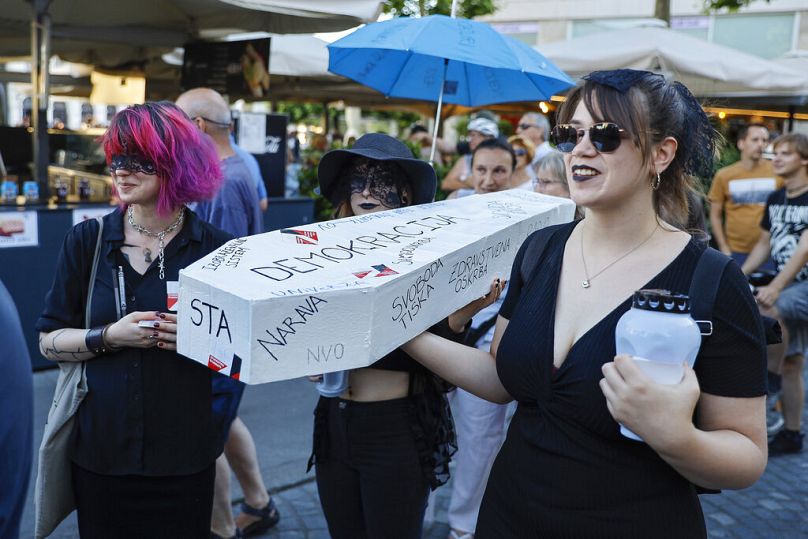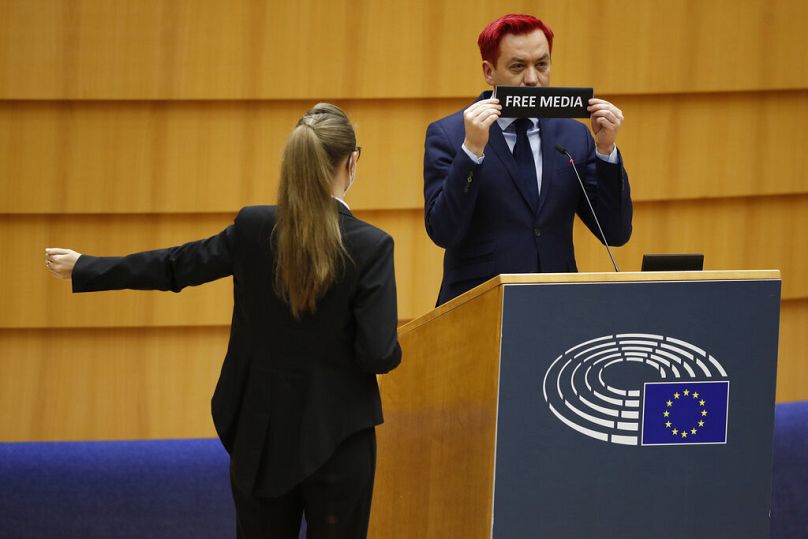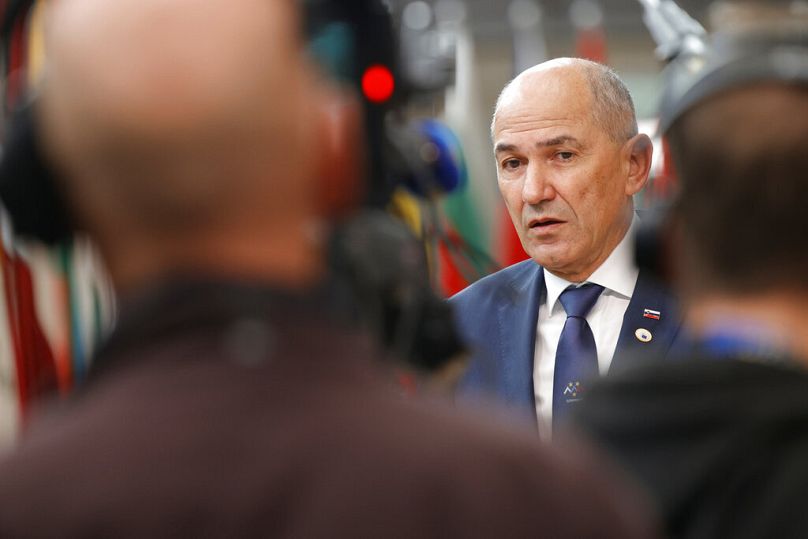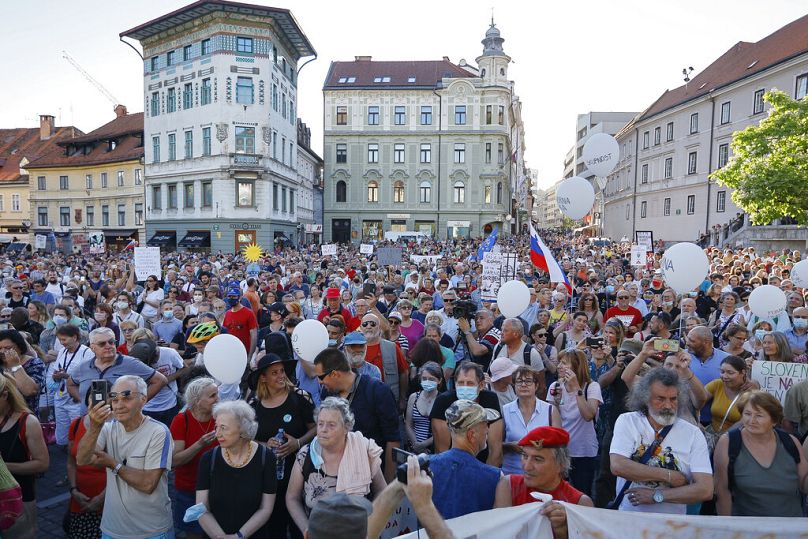Thirty years after the EU formally recognised Slovenian independence, one of its former champions is presiding over an erosion of press freedom and civil society. Act now before it's too late, warns CIVICUS researcher Aarti Narsee.
"Janša is not the voice of Slovenians."
This is the message being conveyed by Slovenians during the Friday anti-government protests they have staged weekly since Prime Minister Janez Janša came to power in March 2020: his third term in office.
Janša was once branded a national hero, having played an important role in leading his country to the path to independence: an independence formally recognised by the European Union 30 years ago, on January 15, 1992.
Today, however, many Slovenians say Janša must go. He and his far-right Slovenian Democratic (SDS) Party have repeatedly targeted the very civic freedoms he once defended. In June 2021, Slovenia was placed on the CIVICUS Monitor Watchlist, which issues alerts on countries where there has been a recent and rapid deterioration in civic freedoms.
Starving out culture and environmental projects
The Slovenian government has sought to delegitimise the work of civil society actors by publicly vilifying them and cutting crucial funding resources. In particular, civil society groups working on environmental rights and culture have faced major obstacles.
The most recent attempt at destabilising civil society came on December 8, 2021, when the Slovenian parliament approved the state budget for 2022, with projections for 2023 and 2024.
It saw major funding cuts to civil society organisations (CSOs) working on environmental rights and culture. The budget for promoting cultural creativity shrank from €6.4 million to €3.6 million.
No funds were allocated for environmental projects for 2022 or 2023. In addition, the climate fund for which environmental CSOs are eligible has been slashed by 70 percent.
This isn’t the first time the government has stymied the resourcing of civil society. In 2020 it undertook a rebalancing of the budget to tackle COVID-19, which resulted in budget cuts to the cultural sector while other areas remained unaffected.
A new de-bureaucratisation law submitted to the National Assembly in September 2021, without open and transparent consultation, further threatens the status of cultural CSOs.
The government stated that the purpose of the bill was to “improve the competitive business environment” and “simplify the lives of citizens” by “removing administrative barriers”. But many believe the amendments will lead to an increase in the level of political interference in CSOs’ decision-making processes around funding.
Twenty NGOs threatened with homelessness
Civil society in Slovenia has also been intimidated through other means. In October 2020, in the middle of the second wave of coronavirus, no fewer than 20 different CSOs operating at an address in Ljubljana – No. 6 Metelkova Street – received an order from the Ministry of Culture to vacate the building by January 31, 2021.
Metelkova is one of the largest and most successful urban squats in Europe. It is derived from the heritage of civil society movements that promoted democratisation and demilitarisation in the 1980s.
The CSOs based in the building strongly protested against the Ministry's decision. They see it as yet another attempt to silence the cultural sector. While they managed to halt the eviction temporarily, a final decision is expected in the coming months. This has been a costly legal fight for groups already facing resourcing challenges.
Independent journalism undermined
Media independence in Slovenia also hangs in the balance, with the government using similar tactics to those adopted by Hungarian Prime Minister Viktor Orbán to capture independent media.
Janša wrote extensively promoting free speech for independent magazine Mladina in the 1980s. Today, he is described as Europe's Trump. He frequently instigates attacks on journalists in person and on social media, calling them “liars” and “presstitutes”.
There were two main media targets for the government in 2021: the Slovenian Press Agency (STA) and the broadcaster RTV Slovenija. Both remain under attack.
The STA was severely hampered by financial crisis after it was left without legally-mandated state funding for more than 300 days. In the end, an agreement was reached between the government and the agency in November 2021, granting the STA a stipend for 2021.
But concerns over the future of the agency (and its editorial independence) remain, and undoubtedly, some damage has already been done. Several journalists resigned and the quality of the STA’s work has been compromised.
Meanwhile, there is an ongoing battle for the independence of RTV Slovenija, which journalists and editors continue to defend.
On 20 August 2021, RTV’s director of programmes, Natalija Gorščak was dismissed by newly-appointed director-general Andrej Grah Whatmough. The move is believed to have come in retaliation for her refusal to support Whatmough’s proposed demands regarding staffing and programming changes.
In October 2021, four editors had resigned in protest against the draft Program-Production Plan (PPN) for 2022, which was later approved.
The plan would see news-related talk shows being cancelled and daily news programmes shortened, with other items including election programming shifted to the broadcaster’s second channel, which has far lower viewership. There are concerns that these changes are a ploy to create a pro-government media platform ahead of elections in April.
EU should pay attention before it's too late
Civil society and grassroots activists in Slovenia have continued to resist this ongoing attack on civic freedoms. Thousands of people have taken to the streets of Ljubljana and other cities, staging bicycle rallies as a creative way of complying with coronavirus restrictions.
The government has responded by blaming protesters for spreading the virus and trying to intimidate them, with the state attorney filing its first lawsuit against organisers in December 2021.
The participants, however, remain determined. “Friday's protests will continue at least until the elections and until actual democracy is established in Slovenia!”, they wrote on their Facebook Page.
The Slovenian parliamentary elections will be crucial in determining the future of democracy in the country. And civil society is doing everything in its power to mobilise.
More than 100 CSOs have backed an initiative called Glas ljudstva (Voice of the People), which will take joint action to encourage public participation in election debates, monitor the electoral process, inform citizens, and mobilise them to vote.
Thirty years since Slovenian independence was recognised by the whole European bloc, the message from citizens is clear.
The EU should be paying attention to the decline of civic freedoms and growing illiberalism in this country, having failed to act quickly enough when Hungary and Poland started down the same path. And it must fundamental rights are preserved by taking urgent action, before it's too late.
Aarti Narsee is a feminist, writer and journalist, and civic space researcher for CIVICUS Monitor, an online tool providing close to real-time data on the state of civil society in 196 countries, specialising in Europe and Central Asia.


